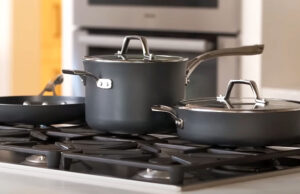As an Amazon Associate, I earn from qualifying purchases at no extra cost to you.
How Long Does an Oven Last? Everything You Need to Know!
Ovens are essential in almost every kitchen, whether you’re baking a cake, roasting vegetables, or making a hearty casserole. But just like any appliance, an oven doesn’t last forever. Understanding how long an oven is expected to last and what factors affect its lifespan can save you time, money, and headaches. This article will explore how long ovens last, the signs your oven may need replacing, and some tips on making your oven last as long as possible. Let’s dive in!
Understanding Oven Lifespan: How Long Should an Oven Last?
An oven’s lifespan can vary, but on average, you can expect an oven to last between 10 to 15 years. However, this estimate can change depending on several factors like the oven type, how often it’s used, and how well it’s maintained. The quality of the oven also plays a significant role—higher-end models tend to last longer, while budget-friendly options may need replacing sooner. It’s important to note that while ovens are built to last, they do require some care to reach the higher end of that lifespan. So, what exactly impacts how long an oven lasts? Let’s take a closer look at some of the key factors.
Factors That Affect How Long an Oven Lasts
There are several factors that can affect how long your oven will last, and understanding them can help you take steps to extend its life. First, the brand and model of the oven are important. High-quality, reputable brands tend to use more durable materials, which means their ovens may last longer than cheaper models. If you opt for a well-known brand that offers reliable customer service and warranties, you’re more likely to get a long-lasting appliance.
Another major factor is how frequently the oven is used. If you use your oven daily, especially for heavy-duty cooking like baking or roasting, it may wear out faster than an oven used only occasionally. The type of oven also matters. For instance, electric ovens tend to last longer than gas ovens because electric ovens have fewer moving parts that can break down. Gas ovens, while generally more efficient for cooking, have more complex parts like gas lines and ignition systems that can wear out over time.
Lastly, maintenance plays a big role in how long an oven lasts. Keeping your oven clean, checking for issues like broken door seals, and having it inspected regularly can extend its life. Like any appliance, proper care can help keep an oven running smoothly for many years.
How to Tell When Your Oven Needs Repair or Replacement
Ovens don’t last forever, and eventually, you might start to notice signs that your oven is nearing the end of its life. One common sign is inconsistent heating. If you notice that your oven isn’t cooking food evenly or that it takes longer than usual to heat up, it could be a sign that something is wrong with the heating element or thermostat. In some cases, this may be an issue that can be repaired, but if the oven is old, it may be time to replace it.
Another warning sign is strange noises coming from the oven. This could be a sign of a malfunctioning fan, faulty motor, or issues with the heating elements. Additionally, if your oven is taking longer to cook food or isn’t reaching the correct temperature, it may be time to have it checked out. A properly functioning oven should heat up quickly and maintain an even temperature throughout the cooking process.
Visible wear and tear is also something to look out for. Cracks in the oven door, broken knobs, or worn-out seals can all affect your oven’s ability to work properly. If you notice these kinds of damages, it’s a good idea to have a professional assess whether it’s worth repairing or if replacing the oven is the best option. Finally, if your oven is showing error codes or consistently failing to operate, it may be time to say goodbye to your old oven and get a new one.
Gas vs. Electric Ovens: Which One Lasts Longer?
One important decision when it comes to buying an oven is whether to choose a gas or electric model. While both types of ovens have their benefits, the lifespan of each can differ. Generally, electric ovens tend to last longer than gas ovens, typically around 13 to 15 years, while gas ovens often last around 10 to 12 years. The reason for this is that electric ovens have fewer moving parts and less complex components, making them more durable over time.
Gas ovens, on the other hand, often heat up more quickly and are favored by people who prefer cooking with gas for its efficiency. However, gas ovens have more components that can wear out, such as gas lines, pilot lights, and ignition systems, which can affect their longevity. Despite this, some users prefer gas ovens for their cooking performance and cost efficiency, especially if they have access to natural gas. Choosing between gas and electric should depend on your preferences for cooking, but if longevity is your primary concern, an electric oven might be the better option.
Maintaining Your Oven for Longevity
Regular maintenance is key to extending the lifespan of your oven. Keeping it clean and addressing minor issues before they become bigger problems can help ensure that your oven lasts as long as possible. One of the most important things you can do is clean your oven regularly. After each use, wipe down the oven to remove food spills or grease buildup. Periodically, deep clean the interior of the oven, removing any baked-on food or residue. A clean oven is not only more efficient but also less likely to suffer from long-term wear and tear.
It’s also important to check the door seals and gaskets regularly. If these parts become worn or cracked, the oven will have a harder time maintaining heat, which can cause it to work harder and wear out faster. Replacing the seals when needed can improve the oven’s efficiency and help it last longer. Similarly, you should inspect the oven’s heating elements to ensure they are functioning properly. If you notice any broken or damaged components, it’s best to replace them before they cause more damage.
In addition to cleaning and inspecting, it’s a good idea to have a professional check-up every few years. A technician can identify potential issues before they become significant problems, saving you from expensive repairs or premature replacements. Scheduling regular maintenance is a proactive way to keep your oven running smoothly and efficiently for as long as possible.
Frequently Asked Questions
Is it possible to extend the life of my oven?
Yes, you can extend your oven’s life by maintaining it regularly, cleaning it often, and addressing minor issues quickly.
Can an oven last 20 years?
While some high-quality ovens may last up to 20 years, it’s uncommon. Most ovens last around 10 to 15 years, depending on usage and care.
Do I need to clean my oven frequently?
Yes, cleaning your oven regularly will help maintain its performance and extend its lifespan. Wipe up spills right away and deep clean every few months.
Is it cheaper to repair or replace my oven?
It depends on the age of the oven and the cost of repairs. If your oven is over 10 years old and the repair is expensive, it might be cheaper to replace it.
Can I repair my oven myself?
Some minor issues, like replacing oven seals or heating elements, can be done at home. However, it’s often best to consult a professional for complicated repairs.
Do I need to hire a professional to inspect my oven?
While it’s not required, having a professional inspect your oven every few years can help catch issues early and ensure it’s working properly.
Is it safe to use a gas oven if the pilot light goes out?
If your gas oven’s pilot light goes out, it’s usually safe to relight it yourself. However, if you smell gas or the oven still doesn’t work, contact a professional.
Can a broken oven affect my electricity bill?
Yes, a malfunctioning oven, especially one that doesn’t heat properly, can use more energy, increasing your electricity bill.
I hope this article helped you understand how long an oven lasts and how you can care for yours to keep it running longer. Whether it’s regular maintenance or knowing when it’s time to replace it, proper attention to your oven’s health can save you time and money in the long run.



